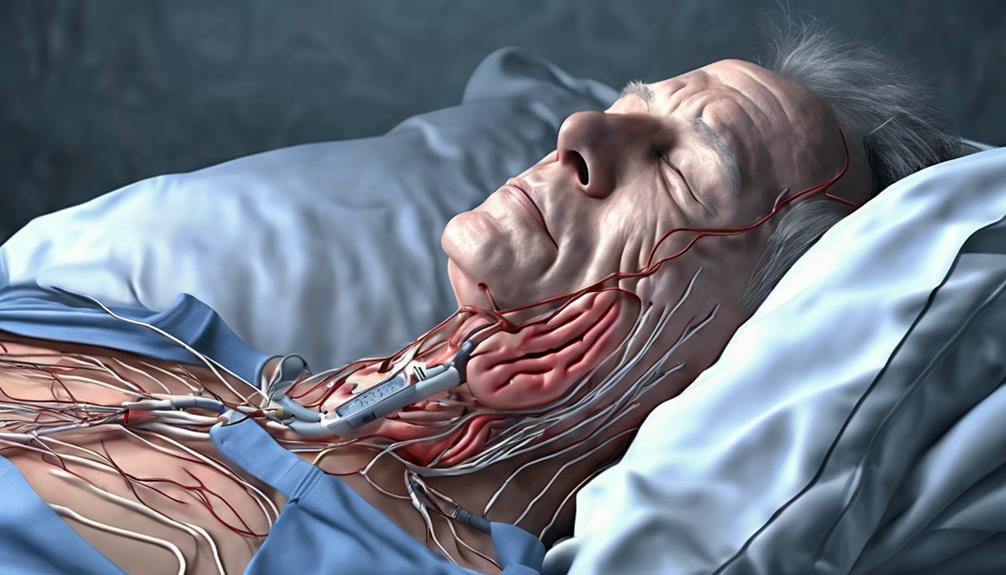When we lose our appetite, it could be due to health issues, like cancer or diabetes. Psychological factors, such as depression or anxiety, might also play a role. Medications, like chemotherapy drugs, can affect how hungry we feel. As we get older, our taste preferences and metabolism change, impacting our desire to eat. If this happens to you, seek help to address the root causes. Understanding why our appetite decreases is important for our well-being. By learning more about the reasons behind appetite loss, we can make informed choices to improve our health.
Key Takeaways
- Underlying health conditions like cancer and diabetes can lead to appetite loss.
- Psychological factors such as depression and anxiety can significantly impact appetite.
- Medications, especially chemotherapy drugs, are known to suppress appetite.
- Age-related changes, including metabolism slowing down, can decrease desire for food.
- Seeking professional help is crucial to manage underlying issues affecting appetite.
Common Causes of Appetite Loss
Common causes of appetite loss encompass a range of underlying health conditions, psychological factors, medications, and age-related changes. When it comes to medical causes, conditions like cancer, diabetes, and kidney disease can play a significant role in reducing appetite. These illnesses affect the body's metabolism and can lead to a decreased desire for food.
On the psychological front, factors such as depression, anxiety, and stress can also have a profound impact on appetite. These emotional challenges can alter the way our brains perceive hunger and satiety, influencing our eating habits. Additionally, certain medications like chemotherapy drugs, antibiotics, and specific pain medications may suppress appetite as a side effect, further contributing to a loss of interest in food.
It's essential to consider these medical and psychological causes when addressing appetite loss, as they highlight the importance of seeking professional help to identify and manage the underlying issues affecting our desire to eat.
Impact of Medical Conditions

Medical conditions such as cancer, hyperthyroidism, chronic diseases, infections, and neurological disorders can greatly impact appetite levels. When our bodies are dealing with these underlying conditions, changes in appetite are common. For instance, certain cancers like pancreatic or stomach cancer can lead to symptoms such as stomach pains and rapid weight loss, resulting in a decreased desire to eat.
Chronic diseases like diabetes, kidney disease, and liver disease can also contribute to a loss of appetite. Infections such as HIV/AIDS or tuberculosis, as well as neurological disorders like Alzheimer's or Parkinson's, can further exacerbate appetite changes. It's important to recognize that appetite loss can cause additional issues like fatigue, weakness, and digestive problems such as constipation or diarrhea.
Seeking medical attention to diagnose and address the underlying medical conditions is essential in managing appetite changes effectively. If you or someone you know is experiencing significant appetite changes, consulting a healthcare professional for proper evaluation and treatment is indispensable.
Influence of Psychological Factors
When dealing with loss of appetite, it's important to acknowledge the significant influence that psychological factors such as depression, anxiety, and stress can have on one's interest in food. Depression, a condition characterized by persistent feelings of sadness and hopelessness, can often lead to a decreased appetite and a lack of enjoyment in eating.
Similarly, anxiety, which manifests as excessive worry or fear, can cause changes in appetite, making it difficult to feel hungry or enjoy meals. Additionally, eating disorders like anorexia nervosa or bulimia nervosa are severe mental health conditions that impact one's relationship with food, leading to significant appetite changes and unhealthy eating habits.
Understanding how these psychological factors affect appetite is vital in addressing and managing loss of appetite. Seeking help from mental health professionals, such as therapists or counselors, can provide valuable support in dealing with depression, anxiety, and eating disorders to improve one's relationship with food and overall well-being. These professionals can help individuals identify underlying triggers and develop coping strategies tailored to their specific needs. Through therapeutic approaches like cognitive-behavioral therapy (CBT) or mindfulness techniques, individuals can work towards restoring a healthier connection with food. Exploring anxiety and appetite loss solutions in collaboration with mental health experts can lead to long-term improvements in emotional health and nutritional habits.
Role of Age in Appetite Changes

As we age, our taste preferences can change, influencing our appetite for certain foods. Additionally, our metabolism slows down with age, affecting how our bodies process food and regulate hunger.
Understanding these age-related factors can help us make informed choices to maintain a healthy appetite as we grow older.
Age-Related Taste Changes
In our later years, age-related taste changes can have a substantial impact on our appetite, affecting up to 30% of older individuals. As we age, physiological changes affect how we perceive taste and regulate our appetite. This can lead to a decreased desire for food and potentially impact our overall nutrition. To understand this better, let's look at the following table:
| Age-Related Changes | Taste Perception | Appetite Regulation |
|---|---|---|
| Physiological alterations | Diminished sensitivity to flavors | Changes in hunger/fullness cues |
| Peptide YY levels increase | Altered taste preferences | Feeling full more quickly |
| Illnesses like Alzheimer's and Parkinson's | Reduced enjoyment of food | Decreased hunger signals |
Recognizing these age-related factors can help us support older adults dealing with appetite changes effectively.
Impact on Metabolism
Understanding the role of age in appetite changes sheds light on the impact on metabolism in older individuals. When it comes to aging and appetite regulation, there are several key points to keep in mind:
- Metabolism: As we age, our metabolism tends to slow down, leading to a decrease in energy expenditure. This can influence how much food older individuals feel like eating.
- Nutrient Intake: Age-related changes in metabolism can affect how efficiently nutrients are absorbed and utilized by the body, potentially impacting overall health and well-being.
- Energy Balance: Maintaining a healthy balance between energy intake and expenditure becomes essential in older age, as changes in metabolism can make it easier to consume more calories than needed.
Medication-Related Appetite Loss

Certain medications we take can affect our appetite, causing us to feel less hungry than usual. These drugs, like opioids and chemotherapy medications, can have side effects that impact how much we want to eat.
It's important to talk to a healthcare provider about any changes in appetite due to medication, as they can help manage these effects and explore possible solutions.
Medication Impact on Appetite
Medications such as opioids, antidepressants, and chemotherapy drugs can often result in appetite loss as a notable side effect. When these medications impact appetite, it can be challenging to maintain a balanced diet and proper nutrition. Understanding how medications affect appetite is important for managing changes effectively.
- Chemotherapy Drugs: Cancer treatments, particularly chemotherapy, are well-known for suppressing appetite and reducing food intake.
- Discuss with a Healthcare Provider: It's essential to talk to a healthcare provider about any medication-related appetite changes to explore possible alternatives or solutions.
- Monitoring and Management: Appetite loss from medication can impact overall well-being, requiring careful monitoring and appropriate management strategies.
Side Effects of Drugs
When medications impact appetite, it can greatly influence our eating habits and overall well-being, especially with common side effects like appetite loss from drugs such as opioids, antidepressants, and chemotherapy medications. Some medications alter our body's normal hunger signals, leading to decreased appetite. Here is a table outlining common medications and their potential side effects on appetite:
| Type of Medication | Examples | Side Effects on Appetite |
|---|---|---|
| Chemotherapy Drugs | Cisplatin | Appetite Suppression |
| Opioids | Oxycodone | Decreased Appetite |
| Antidepressants | Prozac | Changes in Appetite |
Understanding these medication-related side effects can help us navigate changes in appetite and discuss concerns with healthcare providers.
Managing Medication-Related Loss
Discussing with healthcare providers how to manage medication-related loss of appetite is essential for finding solutions and improving overall well-being. Here are three practical tips for managing medication-related appetite loss:
- Communication: Openly discuss any changes in appetite with your healthcare provider to explore medication alternatives or adjustments.
- Nutritional Support: Work with a dietitian to create a meal plan that focuses on nutrient-dense foods to support your appetite and overall health.
- Regular Monitoring: Keep track of your appetite changes and any side effects related to medication, sharing this information with your healthcare provider for ongoing assessment and management.
Understanding Anorexia Nervosa

Individually experiencing anorexia nervosa often struggle with a distorted body image and a pervasive fear of gaining weight, driving them to restrict food intake severely. This serious mental health condition can lead to severe weight loss and malnutrition. People with anorexia nervosa may develop rituals around food, like cutting it into small pieces or avoiding certain food groups.
It's essential to understand that anorexia nervosa has the highest mortality rate of any psychiatric disorder. Physical complications such as heart problems, electrolyte imbalances, and organ damage can arise. Treatment for anorexia nervosa usually involves a multidisciplinary approach. This may include therapy, nutritional counseling, and medical monitoring to address both the physical and psychological aspects of the disorder.
If you or someone you know is struggling with anorexia nervosa, seek help from healthcare professionals who specialize in eating disorders. Remember, recovery is possible with the right support and treatment.
Addressing Alcohol Dependences Effect

How does alcohol dependence impact appetite and overall health?
Alcohol dependence can have a substantial effect on appetite and overall health in several ways:
- Brain Chemistry Alterations:
Alcohol dependence can disrupt the brain's reward system and impact neurotransmitter levels, leading to a reduced interest in food and decreased appetite.
- Nutritional Deficiencies:
Chronic alcohol use can result in malnutrition, liver damage, and gastrointestinal issues, all of which can contribute to appetite loss and further worsen overall health.
- Digestive System Complications:
Alcohol-related gastritis and pancreatitis can cause symptoms like abdominal pain, nausea, and vomiting, which can suppress appetite and make it challenging to maintain proper nutrition.
Seeking treatment for alcohol dependence is essential to address these effects on appetite and overall health. By addressing the root cause of the issue and receiving appropriate support and care, individuals can work towards improving their appetite, nutritional status, and well-being.
Frequently Asked Questions
What to Do When You Have No Appetite?
When we have no appetite, focusing on nutrient-dense foods, keeping a food diary, light physical activity, seeking healthcare support, and exploring new flavors can help improve eating habits. These steps aid in promoting overall well-being.
Why Don T I Get Hungry?
We don't get hungry sometimes due to various factors like stress, illness, or medications. It's crucial to listen to our bodies and seek medical advice if persistent. Let's care for ourselves by understanding and addressing our lack of appetite.
What Deficiency Causes Lack of Appetite?
Certain nutritional deficiencies like zinc, iron, and certain B vitamins can cause a lack of appetite. Zinc deficiency can alter taste and smell, impacting appetite. Iron deficiency anemia leads to fatigue and decreased desire to eat. Vitamin B12 deficiency affects appetite regulation.
Why Do I Lose My Appetite and Feel Tired?
We often find ourselves losing appetite and feeling tired due to various factors like infections, chronic illnesses, medication side effects, and emotional stress. It's a challenging journey, but seeking help can guide us towards recovery.
Conclusion
To sum up, experiencing a loss of appetite can be caused by a variety of factors such as medical conditions, psychological influences, age, medication, or even anorexia nervosa.
It's important to address these issues with the help of a healthcare professional to determine the underlying cause and find the appropriate treatment.
Just like a compass guides us in the right direction, seeking help can lead us towards regaining a healthy appetite and overall well-being.









